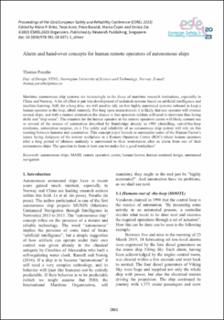Alarm and hand-over concepts for human remote operators of autonomous ships
Chapter
Published version
Date
2023Metadata
Show full item recordCollections
- Institutt for design [1151]
- Publikasjoner fra CRIStin - NTNU [38685]
Abstract
Maritime autonomous ship systems are increasingly in the focus of maritime research institutions, specially in China and Norway. A lot of effort is put into development of technical systems based on artificial intelligence and machine learning. Still, for a long time we will need to rely on that highly automated systems onboard keep the human operator in the loop, albeit remotely. For long open ocean transits it is likely that one operator will oversee several ships, and with a mature automation the chance is that operators seldom will need to intervene thus losing skills and “ship sense”. The situation for the human operator in the remote operation centre will likely contain a several of the ironies of automation described by Bainbridge already in 1983 (deskilling, out-of-the-loop syndrome, automation surprise, etc.) The safety and reliability of an autonomous ship system will rely on this teaming between humans and automation. This concept paper intends to summarise some of the Human Factors issues facing designers of the remote workplace in the Remote Operation Centre (ROC) where human operators after a long period of idleness suddenly is summoned to their workstation after an alarm from one of their autonomous ships. How can we make this a good workplace?
